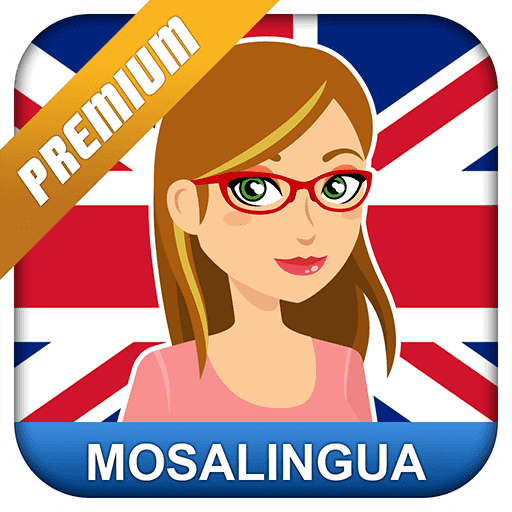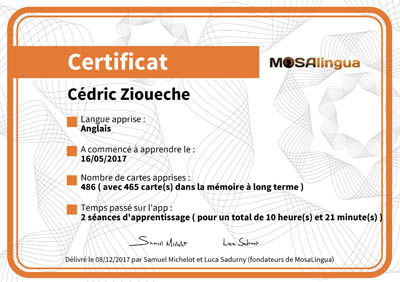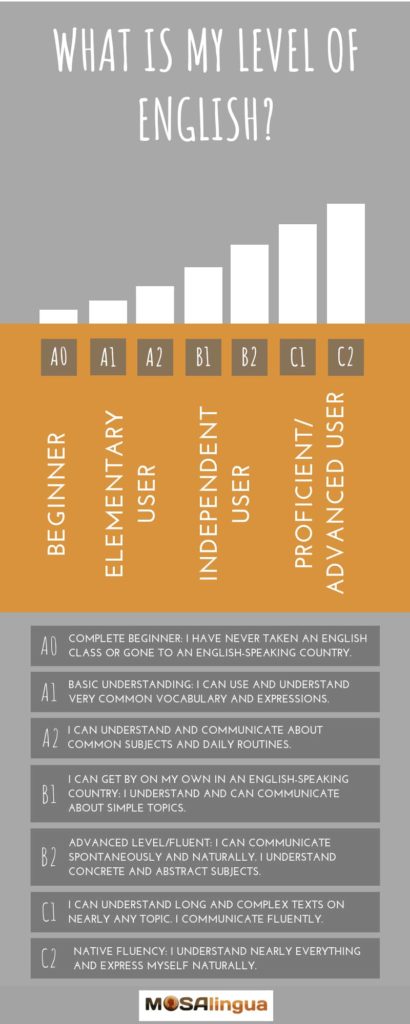At work, in school, on vacation… these are just a few of the places you may be asked, casually or not so causally, “What is your English level?” It’s a tricky question because language skills are not always easy to self-assess, or evaluate by yourself. You could just say: “I understand a little but I find speaking difficult.” But what exactly does that say about your overall level of English? And just between us, would you really write that on your CV? The guide below will walk you through how to determine your English level. We also explain why it’s good to know your level and how you can evaluate it.

Who Cares About My English Level?
Well, depending on who you are, lots of people! But the most important person who should care about your English level is you. Whatever your goal is – doing business, traveling abroad, or acing your language classes, it is important to know roughly where you stand when it comes to English.
Why?
Knowing your level makes it easier to improve

Make your CV stand out
Everyone who has ever written a CV will be familiar with this dilemma. Is it better to say that you have a “beginner” (I don’t want to overestimate my abilities) or “intermediate” (I want to be sure to get the job, after all) level of English? And does the term “intermediate level” even mean anything to recruiters? Should you separate reading, writing, and speaking or group them all into one?
Hmm… I bet you’ve asked yourself some of these questions, right? Of course you have! Because if there is one place where we have to know how to evaluate our English level it is certainly on our Curriculum Vitae. Especially if you’re using it to apply for a great position where you’ll need a good level of English.
An employer or school might ask you your level during the application process. If you pass the first stage of the process with flying colors, next comes an interview. So here’s my advice: don’t lie. If there is one thing recruiters can test you on, it’s your English level. If you say that you have a good level, an interviewer could ask you to answer questions about your English, maybe even in English! Be honest, and you’ll avoid a potentially embarrassing situation!
Know your English level so that your CV matches your actual skills during job interviews. If you’d like to know more, read our article on how to prepare for your job interview in English.
How Can I Test My Level of English?
Start with a self-evaluation
Online tools
- NEW: The English team at MosaLingua created a free English test to give you an idea of your level. It only has 20 questions, so you can quickly get a rough idea of your reading, vocabulary, and grammar abilities.
Take our English level test
-
The Cambridge English Language Assessment website offers a free online English level test. After you take it, the site recommends which official Cambridge English exam to take based on your results. In other words, it’s a pre-test that’s adapted to your level. You can test your general English knowledge, business English, or academic English. There’s also a special test for kids.
- Oxford University Press has practice resources and English grammar tests. They are aimed at a more specific skillset, but it’s still nice to know how you are doing. Take the basic, intermediate, or advanced test and check your answers with the answer keys they provide.
- On the MosaSpeak “Speak English with Confidence” MasterClass homepage, we have a tool for assessing your English speaking skills. You’ll be asked to read a sentence aloud and record yourself. Then, you’ll compare your recording with a version that was read by a native speaker.
MosaLingua English Proficiency Certificate
And if you already use our application for learning English, you probably know that you can download a MosaLingua English Proficiency Certificate. Every time you reach an important milestone with your MosaLingua app (starting once you’ve learned at least 300 flashcards) you’ll get a certificate to download. It’s not only proof of your progress, but also proof of your English skills. Even if it’s not an “officially recognized” certificate, it will give you a good idea of your English level. It’s also something concrete that you can show employers when they ask you that dreaded question we talked about above (“What is your English level?”).
Get your level of English certified
Why get certified?
There is always a good reason to have a certification in languages: traveling abroad, getting a new job, applying to university…. or quite simply to for evidence of your English level after graduation. Plus, it’s good proof for potential employers. Having certain certificates lets you know what your level is, but also legitimizes it in over 100 countries. It’s more advantageous to put on your CV that you have an intermediate level in English if you can back it up with a formal measurement. So, is it helpful to have a certificate in languages? Yes. But be careful, not all certificates are created equal. And which one you should try to get mainly depends on what you would like to do with it.
There are different types of language certificates. Some are more focused on academics (for example, if you want to study in a foreign country) and some are more focused on the business world (if you want to get a job in an English-speaking country). I’ll explain all of this below, in the section about the different recognized certificates. It’s always useful to do new free tests just for yourself. Online tests like the ones I mentioned above are a good way of getting a general idea of your level, and some can even help identify which areas need improvement. But a good English certification is more complete and includes written and oral expression, reading and listening comprehension, vocabulary and grammar. These are all important aspects of any language, and your combined proficiency in all areas will reveal your true English level.
What does certification imply?
Which English certificates or diplomas are recognized?
There are several officially recognized certificates and diplomas. Which one you chose depends on your goals (professional or academic, European or international). Here are the most well-known:
Quite longstanding (it dates all the way back to 1979), the TOEIC is recognized by most companies in the world, and in at least 130 countries. Students often take this exam before beginning a degree program or a new work placement, so they know and can prove their level. It’s a test mainly intended for a professional environment, very popular in companies because it’s an official certification of comprehension, speaking, listening and writing. There are three tests: Listening and Reading, Speaking and Writing for intermediate and advanced levels and the TOEIC Bridge for beginner to intermediate learners. If you’re preparing to take the TOEIC, read about the structure of the test so you know what to expect. Get our best tips about how to prepare for each section in this series:
And learn all of the vocabulary you’ll need for this exam with the MosaLingua TOEIC app.
Surely the most well-known, the TOEFL is the main test used for university admissions. North American universities (in the USA and Canada) and some international schools often ask their foreign students to prove their English level. You can do it online and have your English level evaluated in four linguistic areas (listening comprehension, speaking, reading, and writing) or you can do it on paper. The paper version tests grammar, syntax, and comprehension. Here are our top 5 tips to pass the TOEFL. And be sure to read our series about how to make sure you pass each different section:
Like the TOEIC test, you can prepare for your TOEFL exam using the MosaLingua TOEFL app. And for both of these exams, we’ve also prepared some note-taking strategies for you.
Like its name indicates, the Cambridge Test was created by Cambridge University. It has different tests to determine your English level based on the Common European Framework of Reference to Languages (CEFRL or CEFR). Intermediate (Preliminary English Test and First Certificate in English) and advanced level tests (First Certificate in Advanced English) are used when applying for school or jobs in international companies. To avoid wasting your time and money, self-evaluate your skills before signing up so that you have a good idea of which test to take and whether or not you will pass. This test is becoming more and more well known, not only in Europe but also worldwide.
But beware: US institutions don’t accept this certification because they believe it is based on British English. So we don’t recommend taking this test if you would like to study or work in the USA. But if you want to go to Canada, Australia, New Zealand or one of many other countries (including England, of course!), go for it.
Prepare for the B2 First exam with this series of articles: How to Pass the Cambridge B2 First Certificate
- Cambridge Speaking Section
- B2 First Reading Section
- Cambridge B2 First Exam Listening Section
- B2 First Certificate Writing Section
LinguaSkill is another Cambridge English exam, but this one is more focused on professionals than students because it evaluates your level of business English. (There is also a general version of the test.) It tests four skills in three test sections: reading, listening, speaking and writing. The results are also based on the CEFRL. LinguaSkill Business is recognized by many large, international companies.
Students are tested on topics like buying and selling products/services, at the office, business trips, and HR. It’s a very convenient test for working adults because it is administered online via the Cambridge English Test Portal. Although it’s the most recent certification on our list (it replaced the BULATS exam at the end of 2019), it’s already proving to be a sort of language test revolution. Here’s why:
- LinguaSkill is much cheaper than most other proficiency tests on the market – it costs somewhere between $60 and $120. Companies can also choose to evaluate their current employees or candidates they are thinking about hiring, so if you’re lucky you might not even have to pay for it yourself.
- It’s administered online, so it’s more objective, accessible, and convenient than pen-and-paper tests. Plus, your results are available in less than a week.
Visit the Cambridge University LinguaSkill test website for more information and tips on how to prepare for the exam.
This British certification has quite a similar objective to the TOEFL, which is to say that it validates your English level for university study, most notably in English-speaking countries. In addition, this test is often used if you want to get a work visa or emigrate to a foreign country – especially countries that have a historical link to the United Kingdom (Australia, Canada and New Zealand), and to the UK itself! This test includes four sections: listening, reading, speaking, and writing.
The CEFRL: A Benchmark in English
The CEFRL is a scale used to describe achievements in English. If you take one of the exams we talked about above, it will often give you a level according to this scale. The Council of Europe developed the CEFR scale in the early 1990s. CEFRL stands for Common European Framework of Reference for Languages. It provides a common scale for all European countries to use when evaluating a person’s language skills. When you put it on your CV or mention it during a job interview, recruiters will understand what it means.
The CEFRL comprises 6 English levels (and one added by language schools, A0): A1, A2, B1, B2, C1 and C2, described in detail below. The CEFR is based on objective skills that determine your level of listening and written comprehension, and also your ability to speak and write in English. Just to note, we talk about it as a way of evaluating your English level, but this scale applies to all European languages.
What are the different English levels of the CEFRL?
The CEFRL divides learners into 6 levels: A1, A2, B1, B2, C1, C2. Language schools later created and added level A0. To know your exact level, there are official tests and informal tests you can take online. Just so you have a bit of an overview, here is how the CEFRL defines each of the 7 levels. Watch the video recap right here or on our YouTube channel, or scroll down to read about each level:
What did you think? Don’t forget to subscribe to our channel for more original videos about language.
A0 English level
Level A0 encompasses to those people who have never learned any English. That means people who have never had an English lesson, even at school. People in this group may have never traveled to an English-speaking country or watched an English movie. People at this level have zero knowledge of English (even “I”, “thank you” or “hello”). It’s a rare level in most European countries because the majority of schools require students to learn at least a little English. However, this level does exist and it is important to know it because a completely different approach is needed to teach learners at this level.
A1 English level
Level A1 corresponds to an elementary English user, according to the CEFRL. It’s one of the most represented levels of English; most students who have taken English in school reach this level by the time they graduate. Communication in English, particularly during travel, is complicated and unnatural. When it comes to business, this level of English does not meet the needs or demands of companies and recruiters. According to the CEFRL, someone with an A1 level is capable of:
- understanding and using familiar expressions and day-to-day vocabulary, and satisfying basic needs
- asking and answering simple questions, and introducing themselves or others (name, where they live, age, etc.)
- understanding and communicating with people who speak slowly and clearly
A2 English level
Level A2 also corresponds to an “elementary English user.” Some European high school students reach this level. Traveling to an English-speaking country isn’t simple… but is definitely possible! Someone with this level can manage to be understood – for example, when ordering food in a restaurant or booking a hotel room. Companies and recruiters usually consider this level too low for professional communication, but someone with an A2 level can:
- understand simple phrases and frequently used expressions
- communicate in a simple way, having simple and direct exchanges about familiar and common subjects
- simply describe their surroundings
- talk about topics that relate to their immediate needs
B1 English level
Level B1 moves you up to an “independent English user.” But, between us, we can categorize this level as being the one where you feel comfortable traveling. These learners make syntax and grammar mistakes and still have a somewhat limited vocabulary. But this English level enables simple communication about common topics. It makes meeting people, living abroad, and basically getting by on one’s own possible. In the business world, this English level is usually enough for simple communication in international relations and the service industry. These types of jobs could include airplane steward, receptionist, or other jobs in the food and hospitality industries. Someone who has reached a B1 level can:
- understand the main elements of a message, state things clearly and with correct language, especially when it comes to familiar topics like travel, work and family
- get by fine in an English-speaking country
- describe an event, a dream or plan in a simple way and use everyday vocabulary
At a B1 level, you can start to take tests like the TOEIC or LinguaSkill.
B2 English level
Again, level B2 in English characterizes independent English users. Some people would consider this level “fluency” because you can hold a conversation. But vocabulary, idioms and grammar have not yet been fully mastered and are considered incomplete. On the other hand, someone who has reached this level will not have any trouble traveling to a foreign country or speaking and exchanging written communication with native English speakers. It’s the level generally reached or required for people who are completing master’s degrees. Lawyers and managers of international companies must have at least a B2 level of English. Someone at a B2 level:
- understands the most important ideas of concrete and abstract texts, or technical discussions about their areas of expertise
- communicates easily and spontaneously
- expresses themselves clearly on many subjects, gives their opinions about current events, and identifies pros and cons
C1 English level
A C1 English level describes a “proficient English user.” At this level, people can easily travel to foreign countries. They would also get by just fine if they decided to move to an English-speaking country. If you have a C1 level of English, you will exceed most job requirements. And if you are thinking of becoming a pilot, you have to have reached at least this level! Someone with a C1 English level can:
- understand long texts, sometimes about complex subjects, and “read between the lines” (to understand implicit ideas)
- express themselves spontaneously and fluently, without having to search for their words too much
- use the language without too much difficulty, in social and professional contexts
- organize and articulate their opinions clearly
We definitely recommend taking the TOEIC or LinguaSkill test at this level.
C2 English level
This is the highest level there is, and describes a “proficient English user.” Native English speakers have a C2 level, to give you an idea of how difficult it is to reach. But people who have either studied English extensively or lived in an English-speaking country for a long time can also reach it. People with a C2 level can work just as well in English as they can in their native language. Someone with a C2 level, considered bilingual, can:
- understand practically everything they listen to or read, without much effort
- express themselves naturally and spontaneously, without having to stop and think about which words to use
- come up with nuanced arguments in a foreign language
- coherently summarize a text, even a long and complicated one
When you think you’ve reached a C2 level in English, we recommend taking the Cambridge Proficiency exam. It’s the only exam that validates this level. And it’s good for life!
Bonus Video: Evaluating Your English Level, and Improving It!
Take a look at Abbe’s video, all about assessing your English level and then using that knowledge to improve your skills. The video is in English, so it might even help you assess your level of comprehension! But if you need to, feel free to turn on the subtitles in one of the six languages we offer. You can watch it on our YouTube channel or right here:
One last reminder to subscribe to our YouTube channel for more videos by our teachers!
Want to Learn More?
Before taking off to self-evaluate your English level or study for a test, here are some other articles you might like:
- How to Showcase Your Language Skills on a CV
- Language Certificates: Useful or a Waste of Paper?
- MosaLingua Language Proficiency Certificates
Try to assess your level on your own and estimate where you are on the CEFRL scale. Then, if you want, take one of the other tests I mentioned and see if your results match up. In any case, I hope I’ve convinced you that you should know your English level. If you feel like sharing, do it in the comments section below. 😉








Comments